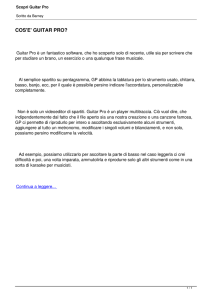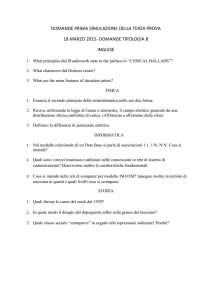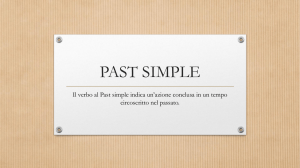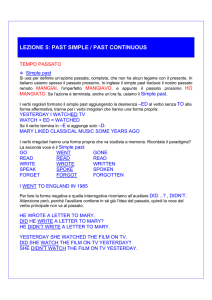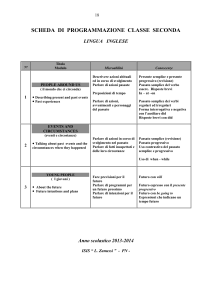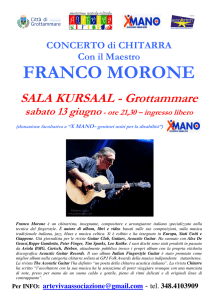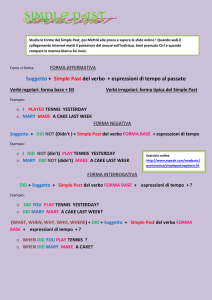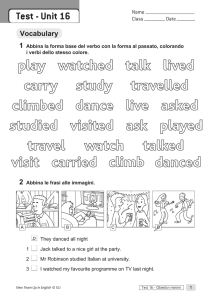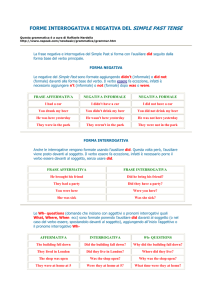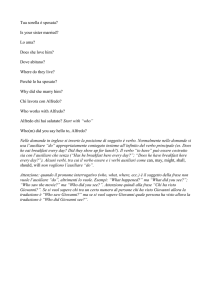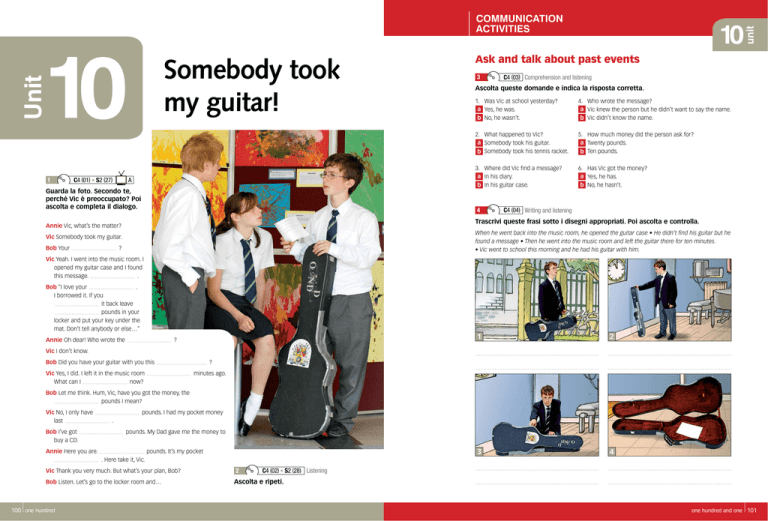
Communication
activities
Unit
1
C4 (01) • S2 (27)
A
Guarda la foto. Secondo te,
perché Vic è preoccupato? Poi
ascolta e completa il dialogo.
3
C4 (03) Comprehension and listening
Ascolta queste domande e indica la risposta corretta.
1. Was Vic at school yesterday?
a Yes, he was.
b No, he wasn’t.
4. Who wrote the message?
a Vic knew the person but he didn’t want to say the name.
b Vic didn’t know the name.
2. What happened to Vic?
a Somebody took his guitar.
b Somebody took his tennis racket.
5. How much money did the person ask for?
a Twenty pounds.
b Ten pounds.
3. Where did Vic find a message?
a In his diary.
b In his guitar case.
6. Has Vic got the money?
a Yes, he has.
b No, he hasn’t.
C4 (04) Writing and listening
Trascrivi queste frasi sotto i disegni appropriati. Poi ascolta e controlla.
When he went back into the music room, he opened the guitar case • He didn’t find his guitar but he
found a message • Then he went into the music room and left the guitar there for ten minutes.
• Vic went to school this morning and he had his guitar with him.
Vic Somebody took my guitar.
............................
Ask and talk about past events
4
Annie Vic, what’s the matter?
Bob Your
unit
10
Somebody took
my guitar!
10
?
Vic Yeah. I went into the music room. I
opened my guitar case and I found
this message. . . . . . . . . . . . . . . . . . . . . . . . . . . . . .
Bob “I love your . . . . . . . . . . . . . . . . . . . . . . . . . . . . .
I borrowed it. If you
. . . . . . . . . . . . . . . . . . . . . . . . . . . . it back leave
. . . . . . . . . . . . . . . . . . . . . . . . . . . . pounds in your
locker and put your key under the
mat. Don’t tell anybody or else…”
Annie Oh dear! Who wrote the
............................
1
?
Vic I don’t know.
Bob Did you have your guitar with you this
Vic Yes, I did. I left it in the music room
What can I . . . . . . . . . . . . . . . . . . . . . . . . . . . . now?
................................
............................
2
..............................................................................
..............................................................................
..............................................................................
..............................................................................
?
minutes ago.
Bob Let me think. Hum, Vic, have you got the money, the
. . . . . . . . . . . . . . . . . . . . . . . . . . . . pounds I mean?
Vic No, I only have . . . . . . . . . . . . . . . . . . . . . . . . . . . . pounds. I had my pocket money
last . . . . . . . . . . . . . . . . . . . . . . . . . . . . .
Bob I’ve got . . . . . . . . . . . . . . . . . . . . . . . . . . . . pounds. My Dad gave me the money to
buy a CD.
Annie Here you are.
............................
............................
3
pounds. It’s my pocket
C4 (02) • S2 (28) Listening
Vic Thank you very much. But what’s your plan, Bob?
2
Bob Listen. Let’s go to the locker room and…
Ascolta e ripeti.
100 one hundred
4
. Here take it, Vic.
..............................................................................
..............................................................................
..............................................................................
..............................................................................
one hundred and one 101
grammar
activities
Ask and talk about past events
Il past simple dei verbi (1)
5
C4 (05) Listening
Ascolta queste frasi.
What did you do yesterday?
I listened to pop music.
I studied.
10
unit
unit
10
Communication
activities
I went into the music room.
Sono andato (Andai) nell’aula di musica.
I opened the guitar case
and I found this message.
Ho aperto (Aprii) la custodia della chitarra
e ho trovato (trovai) questo messaggio.
Il past simple inglese corrisponde al passato prossimo, passato remoto e, in alcuni casi, anche
all’imperfetto italiano.
Il past simple si usa per parlare di un’azione avvenuta nel passato in un periodo di tempo
completamente concluso.
Quindi molto spesso il past simple è accompagnato da espressioni che si riferiscono a un
momento del passato, come per esempio:
• Yesterday
Ieri
• Yesterday morning/afternoon/evening
Ieri mattina/pomeriggio/sera
• Last week
La settimana scorsa
• This morningStamattina (se quando si parla è pomeriggio)
I stayed at home.
Watch out! La forma verbale del past simple è la stessa per tutte le persone, ad eccezione
del verbo be.
In inglese i verbi possono essere regolari o irregolari.
I played tennis.
I wrote a letter.
I went to the cinema.
Verbi regolari
aI verbi regolari formano il past simple aggiungendo -ed alla forma base del verbo.
watch R watched
play R played
bI verbi regolari che terminano in -e aggiungono solo -d.
live R lived
I read a book.
I watched television.
cI verbi che terminano in -y preceduta da consonante cambiano la y in i prima di aggiungere -ed.
study R studied
I surfed the Internet.
dI verbi che terminano con una consonante preceduta da una sola vocale raddoppiano la
consonante finale quando:
• hanno una sola sillaba
stop R stopped
• l’accento cade sull’ultima sillaba
prefer R preferred
I washed my clothes.
6
I bought a CD.
I got up late.
1
Writing
Scrivi quello che hai fatto ieri. Se vuoi, puoi fare riferimento alle attività descritte
sopra. Poi chiedi al tuo compagno.
What did you do…
• yesterday morning?
• yesterday afternoon?
• yesterday evening?
• last night?
102 one hundred and two
YOU
. . . . . . . . . . . . . . . . . . . . . . . . . . . . . . . . . . . . . . . . . . . .
. . . . . . . . . . . . . . . . . . . . . . . . . . . . . . . . . . . . . . . . . . . .
. . . . . . . . . . . . . . . . . . . . . . . . . . . . . . . . . . . . . . . . . . . .
............................................
YOUR PARTNER
............................................
............................................
............................................
............................................
Scegli il verbo regolare appropriato e scrivi le frasi corrette nel tuo quaderno.
1.
2.
3.
4.
5.
6.
7.
8.
Vic Bond (ended • jumped • started) to play the guitar when he was 10.
Annie (helped • closed • watched) the window because she was cold.
Serena and Dorota (listened • watched • danced) television yesterday afternoon.
Mr Bond (studied • moved • travelled) to Manchester by plane last week.
Serena (wanted • looked • lived) to go shopping in the afternoon.
Ralph (showed • asked • worked) very hard yesterday.
Mrs Bond (decided • lived • stopped) to go to the cinema last night.
Bob (asked • showed • opened) the window and he looked out.
one hundred and three 103
grammar
activities
Forma interrogativa del past simple
Verbi irregolari
La forma interrogativa del past simple si ottiene facendo precedere il soggetto dall’ausiliare
did (passato dell’ausiliare do).
I verbi irregolari, invece, hanno una forma particolare per il past simple. Un elenco dei verbi
irregolari più comuni si trova a pagina 62 della Illustrated Grammar.
go R went
see R saw
get up R got up
do R did
2
Did you have your guitar with you this morning?
Did you stay at home in the afternoon? Ora scegli il verbo irregolare appropriato e scrivi le frasi corrette nel tuo quaderno.
Sei stato a casa nel pomeriggio?
What did you do yesterday?
How did you go to school? Che cosa hai fatto ieri?
Come sei andato a scuola?
Tuttavia, quando il soggetto della frase è un pronome interrogativo, la costruzione è uguale a
quella delle frasi affermative (soggetto + verbo al past simple) e non si usa l’ausiliare did.
Who wrote the message? What happened? Chi ha scritto il messaggio?
Cosa è successo?
Rileggi il dialogo a pagina 100. Trova e scrivi la forma passata dei verbi elencati qui sotto. Indica anche se sono regolari (R) o irregolari (I).
take
.................................................................
R
I
open
R
I
.........................................................
R
I
.................................................................
R
I
R
I
.............................................................
borrow
go
find
...............................................................
write
.............................................................
R
I
leave
............................................................
R
I
have
.............................................................
R
I
..............................................................
R
I
give
4
Avevi la chitarra con te stamattina?
Lo stesso avviene quando la frase inizia con un pronome interrogativo come who, what, o un avverbio come how.
1. Vic and Dorota (were • had • gave) at Bob’s party on Thursday.
2. Dorota and her family (went • left • bought) Poland when she was 12.
3. Bob and Stuart (met • put • sang) at 4.15 at the tube station.
4. Stuart and Vic (did • knew • drank) some orange juice in the cafeteria.
5. Yesterday Serena (put • taught • saw) Dorota at school.
6.Mr and Mrs Bond (ate • spoke • read) fish and chips and then they went to the cinema.
7. Annie (found • ran • wrote) a letter to her penfriend.
8. Mr and Mrs Alexander (sat • began • had) on a bench in Hyde Park.
3
10
unit
unit
10
grammar
activities
Completa questo brano con il past simple dei
seguenti verbi.
5
Fai riferimento alla tabella sotto e scrivi 10 dialoghi su cosa hanno fatto Bob
e Dorota la scorsa settimana.
Esempio: A
B
What did Bob do on Monday?
He studied.
BOB
Monday
studied
DOROTA
find • leave • open • go • speak • have • be
Yesterday morning Vic . . . . . . . . . . . . . . . . . . . . . . . . . . to school.
He . . . . . . . . . . . . . . . . . . . . . . . . . . his guitar with him.
The guitar . . . . . . . . . . . . . . . . . . . . . . . . . . in the guitar case.
Vic . . . . . . . . . . . . . . . . . . . . . . . . . . . his guitar in the music room but when
he went back there to get his guitar he had a surprise. He
. . . . . . . . . . . . . . . . . . . . . . . . . . . the guitar case and
he . . . . . . . . . . . . . . . . . . . . . . . . . . . a message.
He . . . . . . . . . . . . . . . . . . . . . . . . . . . . to Bob and the other friends
about this. Bob had an idea.
104 one hundred and four
Tuesday
listened to pop music
watched television
stayed at home
Wednesday played football
surfed the Internet
Thursday
watched television
wrote a letter to a friend in Poland
Friday
played video games
read comics
Saturday
played tennis with Vic
washed her clothes
Sunday
went to the cinema
went to a pop concert
one hundred and five 105
grammar
activities
6
Risposte brevi al past simple
Nel tuo quaderno scrivi domande appropriate alle seguenti risposte.
Esempio: Did you go to the football match on Saturday?
To the football match? No, I stayed at home and watched TV.
1.
2.
3.
4.
5.
6.
7.
8.
At breakfast? I had a cup of milk and some biscuits.
Oh, yes. I studied very hard on Wednesday night.
To the cinema? No, I didn’t. I stayed at home last night.
Last night? Oh, yes. I watched it. I like EastEnders very much.
This morning? I left home at 8 o’clock.
No, I didn’t go to Windsor last weekend. I went to Winchester.
At 7? Oh, no. Yesterday it was Sunday so I got up at 9 o’clock.
Yesterday? No, they didn’t play football. They played tennis.
Le risposte brevi al past simple si formano così: Yes / No + soggetto + did / didn’t.
8
La forma negativa del past simple si ottiene con did not (didn’t) inserito fra soggetto e
verbo.
7
Ho aperto la custodia
e non ho trovato la mia chitarra.
Mrs Bond / go to bed early last night
2
Dorota / stay at home yesterday
morning
3
Mr and Mrs Alexander / watch TV
last night
106 one hundred and six
5
Ted / do his homework after lunch
Mr Bond / eat fish and chips at lunch
Rileggi il dialogo a pagina 100 e rispondi a queste domande con risposte
brevi.
Ho avuto la mia paghetta sabato
scorso.
La forma interrogativa e la forma negativa del past simple di have si costruiscono con
l’ausiliare did. Anche le risposte brevi si formano regolarmente con did.
Did you have your guitar with you this morning? Avevi la chitarra con te stamattina?
Yes, I did.
Sì.
Let’s...
Let’s si usa per fare proposte o per dare suggerimenti.
Bob and Vic / play tennis last
Saturday
6
Sì. / No.
I had my pocket money last Saturday. Let’s go to the locker room.
9
4
Yes, I did. / No, I didn’t.
Il past simple di have è had. In questo caso had si usa senza got.
Did Mrs Bond go to bed early last night?
No, she didn’t. She watched TV.
1
Avevi con te la chitarra stamattina?
Past simple del verbo have
Guarda le illustrazioni e leggi le didascalie. Poi sul tuo quaderno scrivi brevi
dialoghi come nell’esempio.
Esempio: A
B
Did you have your guitar with you this morning?
1. Did Vic find the guitar in his guitar case? . . . . . . . . . . . . . . . . . . . . . . . . . . . . . . . . . . . . . . . . . . . . . . . . . . . . . . . . . . . . . . . . . . . . . . . . . . . . . .
2. Did he find a message? . . . . . . . . . . . . . . . . . . . . . . . . . . . . . . . . . . . . . . . . . . . . . . . . . . . . . . . . . . . . . . . . . . . . . . . . . . . . . . . . . . . . . . . . . . . . . . . . . . . . . . . . .
3. Did he know who the author of the message was? . . . . . . . . . . . . . . . . . . . . . . . . . . . . . . . . . . . . . . . . . . . . . . . . . . . . . . . . . . . . .
4. Did he have £20? . . . . . . . . . . . . . . . . . . . . . . . . . . . . . . . . . . . . . . . . . . . . . . . . . . . . . . . . . . . . . . . . . . . . . . . . . . . . . . . . . . . . . . . . . . . . . . . . . . . . . . . . . . . . . . . . . .
5. Did Vic have the guitar with him in the morning? . . . . . . . . . . . . . . . . . . . . . . . . . . . . . . . . . . . . . . . . . . . . . . . . . . . . . . . . . . . . . . . . .
6. Did Vic have his pocket money last Monday? . . . . . . . . . . . . . . . . . . . . . . . . . . . . . . . . . . . . . . . . . . . . . . . . . . . . . . . . . . . . . . . . . . . . . . .
7. Did Bob’s father give him £10 to buy a book? . . . . . . . . . . . . . . . . . . . . . . . . . . . . . . . . . . . . . . . . . . . . . . . . . . . . . . . . . . . . . . . . . . . . . .
8. Did Annie have £10 with her? . . . . . . . . . . . . . . . . . . . . . . . . . . . . . . . . . . . . . . . . . . . . . . . . . . . . . . . . . . . . . . . . . . . . . . . . . . . . . . . . . . . . . . . . . . . . . . .
Forma negativa del past simple
I opened the guitar case and I didn’t find my guitar. 10
unit
unit
10
grammar
activities
Andiamo nello spogliatoio.
Suggerisci o proponi cosa fare, scrivendo frasi in inglese secondo le istruzioni.
1.
2.
3.
4.
5.
6.
7.
8.
Proponi di andare al cinema.
Let’s surf
Suggerisci di aprire la finestra.
the Internet.
Proponi di cantare una canzone.
Hai fame. Proponi di mangiare un panino.
Suggerisci di guardare la TV.
Proponi al tuo compagno di giocare a tennis.
Suggerisci di ascoltare della musica pop.
Proponi di acquistare un CD.
Yes, great
idea!
one hundred and seven 107
1
integrating
skills
C4 (06) Listening
3
Ascolta e abbina i personaggi alla somma di denaro che hanno in tasca.
10
unit
unit
10
integrating
skills
Writing
Quanto valgono queste monete inglesi? Scrivilo negli spazi.
10 pence (10p) • 1 pound (£1) • 50 pence (50p) • 1 penny (1p) • 5 pence (5p) • 2 pounds (£2) •
20 pence (20p) • 2 pence (2p)
1
3
2
Annie
...................
2.
...................
3.
...................
4.
...................
5.
...................
6.
...................
7.
...................
8.
...................
Dorota
4
Bob
1.
Ralph
4
C4 (07) • S2 (29) Sing along
Ascolta la canzone e circoletta l’alternativa corretta.
This love I was so high I (did • was • had) not recognize
by Maroon 5 The fire burning in her eyes
The chaos that (went • controlled • watched)
my mind
Whispered goodbye and she (played • left •
got) on a plane
Never to return again
But always in my heart
A Five pounds
B Twenty pounds
2
Spoken interaction
C Ten pounds
D Fifty pounds
This love has taken its toll on me
She (asked • said • wrote) goodbye too many
times before
And her heart is breaking in front of me
I have no choice ’cause I won’t say goodbye
anymore
This love has taken its toll on me
She (said • asked • gave) goodbye too many
times before
And her heart is breaking in front of me
I have no choice ’cause I won’t say goodbye
anymore
I’ll fix these broken things
Repair your broken wings
And make sure everything’s alright
My pressure on your hips
Sinking my fingertips
Into every inch of you
’Cause I know that’s what you want me to do
This love has taken its toll on me ...
I (tried • did • ended) my best to feed her
appetite
Keep her coming every night
So hard to keep her satisfied
Kept playing love like it (were • did • was) just
a game
Pretending to feel the same
Then turn around and leave again
Controlla col tuo compagno.
A How much has Annie got?
B She’s got . . . . . . . . . . . . . . . . . . . . . . . .
108 one hundred and eight
5
C4 (08) • S2 (30)
Ora divertiti a cantare.
one hundred and nine 109
integrating
skills
6
9
Reading
10
unit
unit
10
integrating
skills
Vocabulary work
Leggi il brano “Bullying” e la lettera di Justine alla rivista Mizz. Completali con
queste parole.
Rileggi il brano “Bullying” e la lettera di Justine e scrivi accanto alle parole inglesi
i loro equivalenti italiani.
students • me • class • schools • English • friend • schoolboy
arrabbiato • agitato, turbato, sconvolto • impaurito • bullismo • spaventare • prepotente, bullo • far male
Bullying
Bullying is a bad phenomenon in
British . . . . . . . . . . . . . . . . . . . .
A bully is a . . . . . . . . . . . . . . . . . . . or a
schoolgirl who hurts or frightens
young . . . . . . . . . . . . . . . . . . . . Below there
is a letter that Justine, a young
. . . . . . . . . . . . . . . . . . . girl, sent to our
teenage magazine, Mizz.
• bullying
.........................................................................
• frighten .........................................................................
• angry
.........................................................................
• hurt
.........................................................................
• upset
.........................................................................
• bully
.........................................................................
• scared
.........................................................................
10
C4 (10) • S2 (31) Pronunciation Pronuncia della desinenza -ed del passato
1. La desinenza -ed del passato viene pronunciata in tre modi. Ascolta.
/t/
surfed
Dear Mizz,
Some girls are bullying my
Mel
in our
, I try to help her but she
gets really angry and upset with
.
I feel so useless at the moment. How can I
help her?
Justine
. . . . . . . . . . . . . . . . . . .
/d/
opened
C4 (11) • S2 (32)
2. A
scolta e indica il suono della desinenza -ed.
. . . . . . . . . . . . . . . . . . .
. . . . . . . . . . . . . . . . . . .
/id/
wanted
borrowed
washed
/t/
/id/
/d/
What
happened?
started
happened
listened
worked
7
C4 (09) Listening
Ascolta e controlla quello che hai scritto.
watched
ended
played
8
Reading and writing
Questa è la risposta di Mizz alla lettera di Justine. Leggila e poi scrivi quello che
avresti risposto tu.
Bullying is very bad and Mel probably doesn’t want to talk
about it. The best thing you can do is make sure she knows you
are there for her. Encourage her to talk to her teacher or
mum about bullies.
110 one hundred and ten
one hundred and eleven 111

